How Roy Hodgson turned Crystal Palace - and his reputation - around
- Published
- comments
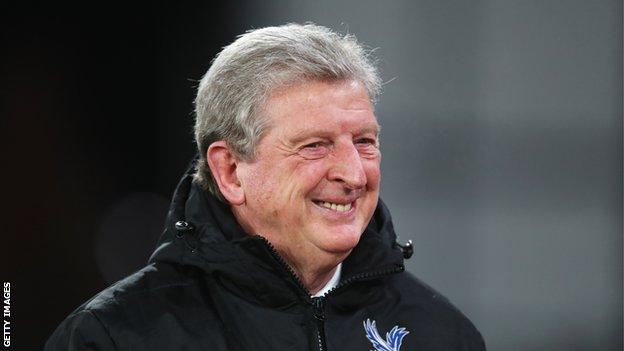
Roy Hodgson had not managed a club team in over five years before being appointed at Palace
When Roy Hodgson sat disconsolately in a media room in Nice to announce his resignation as England manager after the humiliating Euro 2016 exit to Iceland, it looked like a career in coaching and management stretching back 40 years may be over.
Hodgson was then approaching his 69th birthday and looked broken by the pain of seeing England bundled out in the last 16 by rank outsiders.
And yet, a little more than a year on, Hodgson was back at Crystal Palace explaining: "Unfortunately, a long time ago someone injected the drug called football into my veins and I have never been able to shake it off. I am still an addict."
Fortunately for Palace, Hodgson's addiction has seen him conduct a quiet, confident reconstruction of a team stranded with no Premier League points or goals after seven games into the relative comfort of 14th position with 22 points after 18 league games.
So how has Hodgson lifted the Eagles off the ground?
Repetition, repetition, repetition
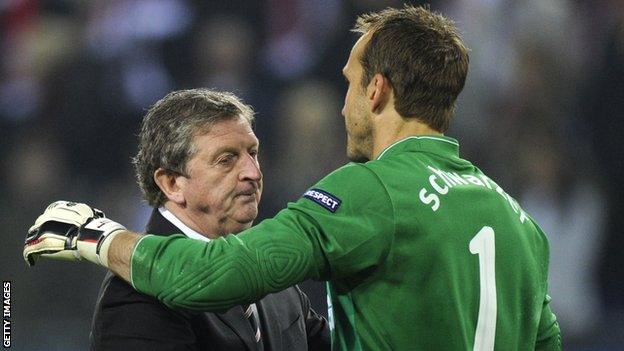
Roy Hodgson took Fulham to the 2010 Europa League final
When Hodgson succeeded Frank de Boer, who was sacked after four league defeats and no goals, on 12 September, the 70-year-old used his tried and trusted methods to reinvigorate a Palace team in danger of being cut adrift at the bottom of the table.
Hodgson may now be a footballing elder statesman, but anyone witnessing the training sessions he put on with England at close quarters will vouch for his hands-on approach. It is his voice and methods that count.
And that involves constant repetitions of the drills he believes get results - even if it may meet with initial displeasure of the players under his control.
Mark Schwarzer, the Australian goalkeeper in Hodgson's Fulham side that remarkably reached the Europa League final in 2010, external only to lose to Atletico Madrid, acts as witness for this approach and its success.
He told BBC Sport: "I remember the first two or three months at Fulham, a lot of the players were coming in pulling their hair out. They were disappointed, they weren't happy about the sessions - but the results started coming and very quickly, when you draw and win games to get results, there is nothing better than that.
"Once you get that you start to execute the plan even at a high level and a more entertaining level and you're getting results. That is the key - you build momentum and confidence.
"It's his authority, his confidence, his assurance that he knows what he's doing. He carries that confidence across in his coaching and his instructions and in his sessions.
"Every session is organised to drill you into playing a certain way of football. Every player knows exactly what position they need to take when they have possession of the ball. Every player knows they have an outlet."
And if they do not put the plan in place, Hodgson will work on Palace's Beckenham training ground until they do.
Such is Hodgson's focus that often even light-hearted games at the end of sessions do not always meet with his approval.
Schwarzer recalls: "Players used to moan all the time, because players are very good at moaning, about wanting to play five-a-side games at the end of sessions but Roy was very reluctant to do it because we worked so hard every day on tactics, on a system.
"It was always someone like his long-time assistant Ray Lewington or Mike Kelly that used to convince Roy to let us have a game and more times than not he would say: 'You get on with it, I'm going inside now.'"
Schwarzer is keen to stress there was plenty of enjoyment under Hodgson but added: "He wanted to be focused on that serious stuff but I must make it very clear there was humour, we'd enjoy it. At the beginning it was tough, but once the players start to adapt to it, start to understand, then the enjoyment comes out because you're having success.
"I've spoken to one of the guys at Palace and he said the difference in the atmosphere is remarkable compared to what it was like before Roy got there."
Former Fulham defender Brede Hangeland, who also worked with Hodgson, agrees and told BBC Sport: "My question was would he get everyone on board with his message because he is quite demanding and old school in many ways?
"Not only has he done so well, he has done it quickly. That's a surprise to me because in the past whenever he has come to a new club it has taken some time for him before you see improvement in performances and results. At Palace it has been almost instantaneous."
Back to basics - the Hodgson trademark
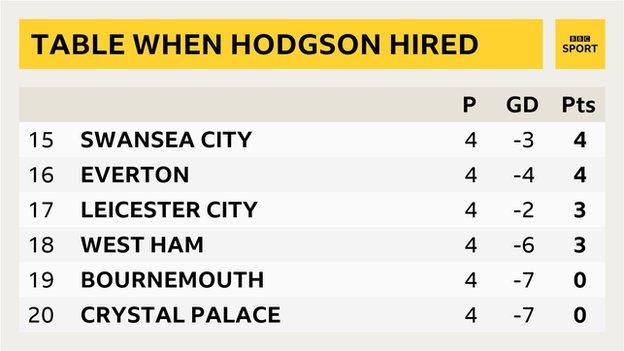
This is what the Premier League table looked like when Hodgson was appointed on 12 September
When De Boer was dismissed, it was clear Palace's players were struggling to adjust to a dramatic change in style from the Dutchman's patient passing approach after the aggressive - and successful - style of his predecessor Sam Allardyce. There were also difficulties with De Boer's methods and communication problems with his squad.
Hodgson has restored order but has applied a combination of the two styles with great success.
In his four games, De Boer had an 18.73% long pass ratio while Hodgson's is 17.03%. Hodgson's average possession per game is 43.15% compared to his predecessor's 49.98%.
The meticulous, disciplined drilling approach on the training ground has reaped a rich reward.
Hodgson may have started his reign with three defeats without a goal, including successive 5-0 and 4-0 losses at Manchester United and Manchester City, but once that first 2-1 win was achieved over champions Chelsea at Selhurst Park on 14 October, he has made his mark.
He is no stranger to the Premier League salvage operation, so Palace would have held no terrors despite their parlous position on arrival. When he was appointed at Fulham in December 2007 they were 19th, two points off safety and survived in 17th place.
Hangeland's revelation that Hodgson's approach took time to take effect at Fulham is illustrated by survival only being ensured by winning four of their last five games, including a 3-2 win over Manchester City after trailing 2-0 at half-time when defeat would effectively have meant relegation. It was still a miraculous piece of escape management.
Hodgson's actual win percentage of 27.8% after 18 leagues may be slightly less than that over the same period when he took over at Fulham and West Brom (33.3%) - but the effect has been hugely positive.
It took Palace 731 minutes to score a league goal this season, but now they look solid in defence, stable in midfield and have a potent attack based around the mercurial talent of Wilfried Zaha.
Hodgson may still have only five wins from his 18 league matches in charge, and the FA Cup exit to Brighton & Hove Albion was disappointing - but the more significant statistic, and one that points to his stabilising effect, is only one defeat in their past 11 league games.
And Schwarzer can see his stamp all over the revival, saying: "Palace have got some very talented players and they have brought in a manager who knows the league, knows the game inside out. The players have obviously taken it on board and responded really well to it.
"I can see it every game from the minute he took over. You could see what he was trying to do with them from the off - shore up the defence, make it difficult to play in between the lines, showing players inside back into this defenders, players are shuffling across.
"They're organised. They're creating traps all over the pitch. They are making it very difficult for teams to play around them and through them. They have the Roy Hodgson trademark.
"They are not conceding as many goals and when they are under pressure they have outlets. They know where to play the ball because they know team-mates will be making runs into those positions because that is the way they work, the way they drill every day in training. It is the result of hours of work with Roy and his team on the training ground.
"Wilfried Zaha's return from injury has been crucial for them, but it's Roy's management skills and his organisational skills on and off the pitch, together with Ray Lewington and the rest of his coaching staff, that has been absolutely vital to their success and their turnaround.
"Roy is very good at reminding players of the basics. He will be teaching those players. They will be learning something. People can get a little bit distracted. Sometimes you have to go back to basics and that is what he does."
More to Hodgson than meets the eye?
Is Hodgson the man to save Palace?
Hodgson's image is of the conservative coach whose strategy is more safety first than flamboyant and there is no doubt his reputation took a severe knock not just with England but also with Liverpool, where he was sacked in January 2011 after winning only seven of 20 league games and with them in 12th position.
He has retained faith in his methods - but he has proved his adaptability at Palace as he utilises the unpredictable and talented Zaha to give his side edge.
De Boer's ill-fated time at Selhurst Park was symbolised by the loss of Zaha to a knee injury after the season's opening game, a 3-0 loss to newly promoted Huddersfield Town, while his return coincided with the winning goal in that crucial win over Chelsea.
And while a succession of teams have leant on the ropes almost waiting to lose against runaway Premier League leaders Manchester City, Hodgson took the positive approach at Selhurst Park on New Year's Eve and ended their winning run, with only an injury-time penalty save by Ederson denying Palace victory.
Palace still became only the second team after Everton to take points off City this season and Hangeland says Hodgson set an example for the rest of the league on how to tackle Pep Guardiola's side.
"Roy more or less gave the rest of the Premier League a lesson on how you can beat City because many have tried, many better on paper than Palace, and failed every time," he said.
"That was down to the way Roy set them up. They used a relatively low [deep] block but not too low because then you end up camped in your own box and then a quick diagonal counter where Zaha and Andros Townsend are the perfect players to have. It showed the tactical mind which sets him apart from many other managers."
And while Hodgson's base camp is organisation and tactical discipline, he has demonstrated with his use of the likes of Zaha that he is willing to incorporate individual flair.
Schwarzer said: "If you put the hard yards in, you are open to listening to change, to taking on instructions, playing to a game plan, then that is what he requires - but he wants that individual talent, the spark to shine through as well.
"It's not like you are coached to the letter of how he wants you to play. He has a set system, a framework that builds confidence but he has those flair players.
"We had it at Fulham with Clint Dempsey, Bobby Zamora, Simon Davies, Andrew Johnson and Damien Duff. We had a system, that framework but when we got into areas where those guys could use individual flair he wants to use that and he has it now at Crystal Palace with someone like Zaha."
England rehabilitation for Roy?
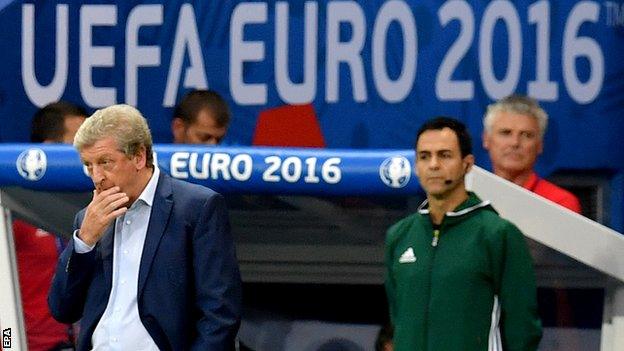
England's defeat by Iceland at Euro 2016 was one of their lowest points at a major tournament
Hodgson was in despair when his England reign ended in failure - but the lure of a Premier League job, no matter how perilous Palace's position, was always going to be too much to resist.
Schwarzer said: "England is a very tough job. We've seen bigger names than Roy come unstuck with the England national team. He's shown at international level he can succeed with the likes of Switzerland. I don't think necessarily he is just suited for club football.
"You see the best of Roy Hodgson when you see him working day to day on the training field with players and that is something you can't do with the national team.
"I had the benefit of catching up with him about 12 months ago. We had dinner with him and a couple of ex-team-mates and we had a really good discussion - all things football of course - about his time with Fulham, Liverpool, West Brom, England and everything else. You could see on that evening he was very determined to come back and give it another go.
"The guy has got an incredible amount of knowledge of the game and enthusiasm at the ripe young age of 70. It would have been a great shame had he not come back and had another opportunity to prove his critics wrong. I've got the utmost respect for him."
And his former Fulham old boy is confident Palace, and their Premier League status, are now in safe hands.
"I said from the day he was appointed it was a masterstroke on Crystal Palace's behalf," says Schwarzer.
"He's perfect for them. He is a perfect fit and I'm sure - although they are by no means out of danger - Roy and Crystal Palace will build a bigger gap between themselves and the bottom three."
- Published9 January 2018
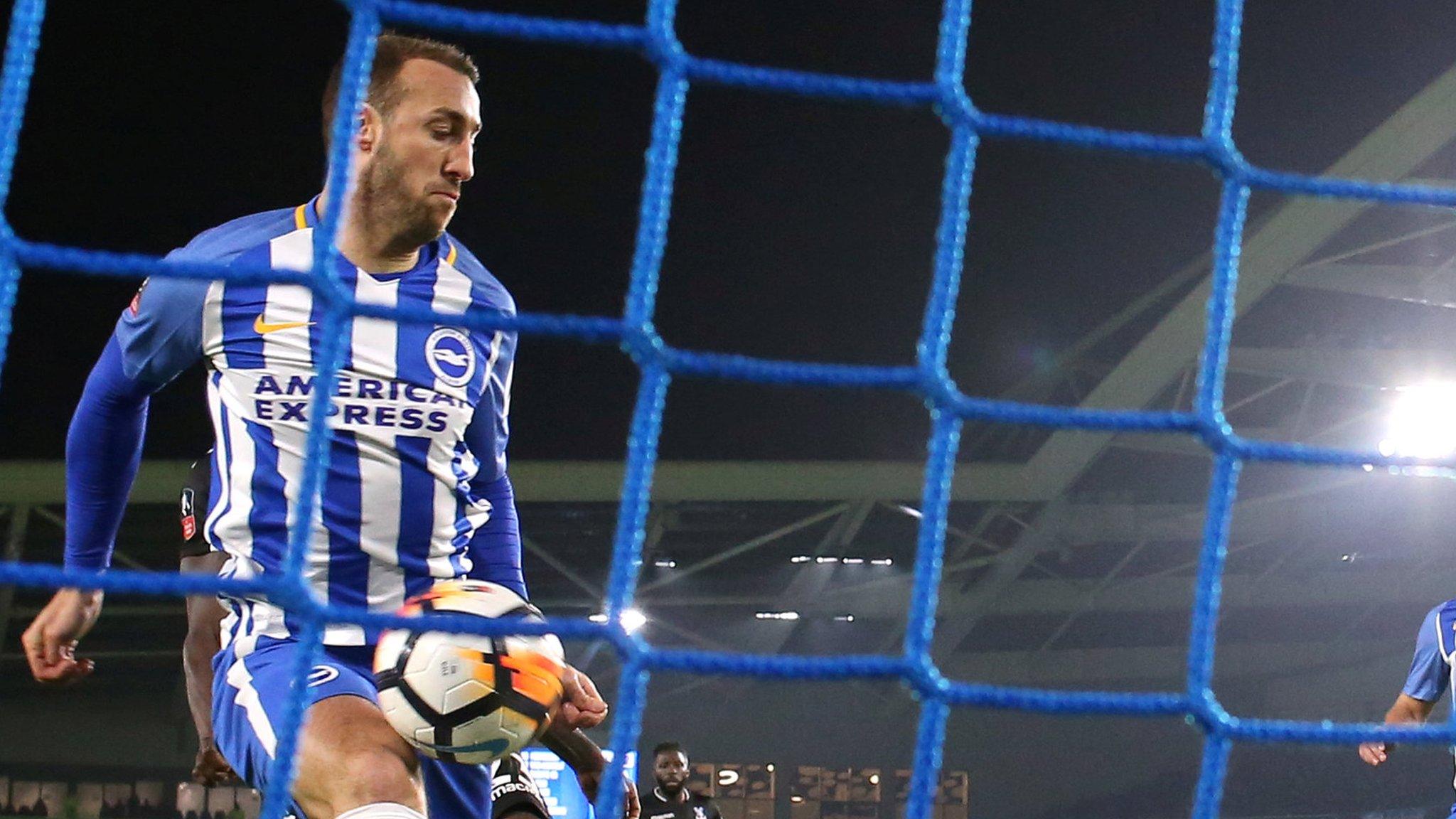
- Published2 January 2018
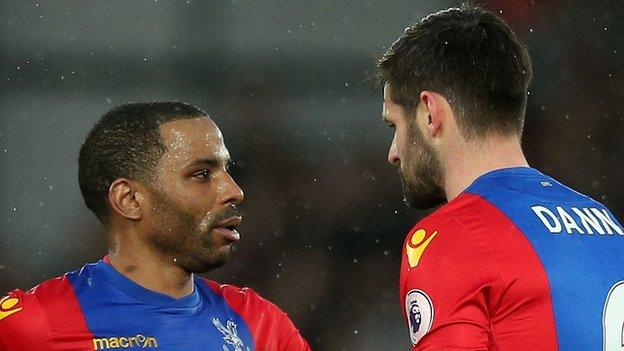
- Published29 December 2017
